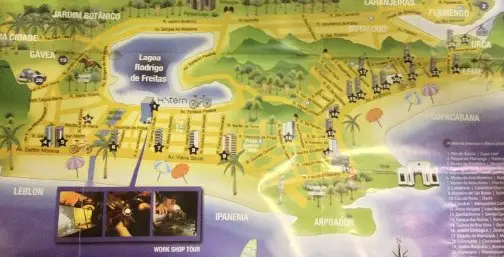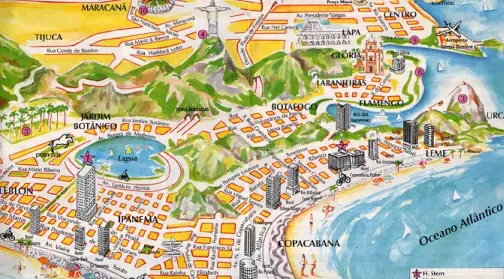Blog
Teaching Students That Do Not Exist
- Wednesday December 2nd, 2015
- Posted by: Guest
- Category: Mais Caminhos and the communities in Rio de Janeiro

Please imagine that you are a child growing up in a favela in Rio de Janeiro. You live in one of the many communities separated from the rest of the city. Living above the city of Rio de Janeiro, you often have inferior infrastructure, limited access to markets/doctors/post offices and typically greater prevalence of drug activity.
Consider your frame of reference; what do you consider normal and appropriate behavior? How do you view authority and public safety?
Consider the education and resources that are available to you if your family is unable to afford a private school education in Brazil, which provides a superior education.
Consider your safety as a child as you commute to school by yourself or walk long distances and take public transportation alone. As mentioned above, the poorer infrastructure in your favela means that you are walking down narrow and steep stairs, unpaved roads or alongside busy roads without safe sidewalks. Not to mention the danger of walking alone when there is active gang violence.
Consider that your neighborhood and your family and friends don’t exist. What??
In each of these maps (found both online and in hotels) the favelas where my students and coworkers live have been replaced by clumps of trees. Looking at the maps, I am given the impression that if Rio (and the tourism industry) ignores the existence of the favelas they might go away.
Imagine if you saw one of these maps as a child growing up in the favela. How would this make you feel?
Would you be angry, lonely, confused, sad, surprised, wonder, aggressive, or motivated, carefree, and radiant? Unless you are a child living in these circumstances, you cannot know for certain. What I can tell you now, in my short time here with Mais Caminhos, is that my students have displayed all of these emotions and more. It is unfair to assume or anticipate someone’s emotions just because you know where they live. It is this reason that I felt (still feel!) unprepared to work with Mais Caminhos.
I knew that when I agreed to volunteer with Mais Caminhos that I was not prepared. How could I be? But being unprepared does not mean that I wasn’t qualified and capable. I have spent the past few years teaching in Title 1 Schools (schools in the United States that are considered under-performing, receive some government assistance and often correlate with students living in poverty). Throughout college, I volunteered with a local shelter working with homeless children. This past spring, I earned a Master’s degree in Education with a focus on English Language Learners and Culturally Relevant Teaching. On paper, I am highly qualified for this job but teaching is about more than a resume.
Nothing can adequately prepare you for the joys and challenges that come with working with children. Every day is different. Every child is different. And everyday my students arrive to class with new and evolved perspectives. The ability to have your perspective shifted and expanded daily is one of the most wonderful aspects of childhood. As a teacher, it is exciting to watch your students grow and mature into young adults. However, because of their developing maturity, it can be hard to anticipate student emotions. How do you teach effectively when your class struggles to control their emotions?
Children FEEL everything. And why shouldn’t they? When your frame of reference is limited to the experiences immediately around you, even the slightest inconvenience can feel life changing and devastating. Students are rarely able to leave their emotions at the classroom door and therefore every mood, good and bad, enters the classroom at 2:00 pm. Our job as volunteers is to teach using Positive Discipline so that our students learn successful coping mechanisms. Learning how to regulate emotions is a skill that takes years to develop and is, in my opinion, one of the largest reasons that adults struggle to understand and validate the emotions of young children.
Everyday that I walk through the doors of the Caminhos Language Centre I know that I am more prepared than I was the day before. I have become more knowledgeable about my students’ backgrounds, their likes, dislikes, and their aspirations. I can sense when they are losing interest in a subject, are tired or distracted by something happening at home. I can tell when they are pretending they don’t understand my accent and when they actually have no idea what I’m talking about. I am able to make jokes and be silly while still earning their respect and love. It has taken months to develop a strong relationship with my students and their confidence in my abilities has made me the best teacher I have even been.
What I can tell you for certain is that my students do exist no matter what a hotel map says. Their lives are valid. Their feelings are valid. Their life experiences are valid. Regardless of the stereotypes cast on children living in the favela, I can assure you that my students are just as capable as any other. I may not always feel prepared to teach them (and they are often not prepared to learn!!) but just trying is enough. As I encourage students to try new things and expand their perspective, I encourage everyone to think about the favelas in a new way. Money, status, and neighborhoods do not define worth. We must all remember that Cantagalo-Pavaozinho, and all the favelas of Rio de Janeiro, are important and deserving of recognition. These communities are more than just a clump of trees. They are my students’ home.
By Katy Chase


 Deutsch
Deutsch Français
Français Português
Português Español
Español



